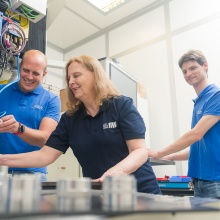Future mobility will be environmentally friendly, networked, and automated. This will require groundbreaking technologies – from new services to innovative drives and components, to new production methods. Pushing this transformation process is the goal of the Innovation Campus “Future Mobility” (ICM) that pools the research and innovation competencies of Karlsruhe Institute of Technology (KIT) and the University of Stuttgart. The State of Baden-Württemberg now plans to largely extend the ICM and will provide another 50 million euros in two packages during the next four years. For the years 2021 and 2022, the ICM will be given the first funding package in the amount of EUR 22.35 million.
“It is our goal to model the Innovation Campus “Future Mobility” on the “Cybervalley” and make it a center for research into mobility and production technologies that is visible throughout Europe. Our major concern is to promote our state in these decisive future fields. We use the crisis situation and the conditions on the labor market to push innovation projects with excellent graduates and scientists,” says State Science Minister Theresia Bauer. “At KIT and the University of Stuttgart, a change is taking place towards the integration of mechanical engineering, electrical engineering, and informatics. This change must be pushed, as merging of these areas is crucial to the viability of the key technology sectors in Baden-Württemberg,” Bauer continues.
“The Innovation Campus “Future Mobility” stands for innovative cutting-edge research from Baden-Württemberg with international reach. With state funding, we will continue to pursue our goal and develop smart systems for sustainable mobility and, hence, for the future of our society,” says the Rector of the University of Stuttgart, Professor Wolfram Ressel.
“Considering the climate goals, we will quickly need sustainable mobility concepts. At the same time, we have high expectations in connection with further automation, digitalization, and networking. This will require profound changes of future mobility solutions,” says the President of KIT, Professor Holger Hanselka. “The partners of the Innovation Campus address these big challenges. The Innovation Campus can give decisive impetus to the mobility transition.”
“KIT, the University of Stuttgart, and the State of Baden-Württemberg are jointly aiming for zero-emission mobility in future. Research and innovations are the basis for developing pioneer drive systems and production technologies and establishing them in application,” says the Vice Rector for Knowledge and Technology Transfer of the University of Stuttgart, Professor Peter Middendorf.
“The Innovation Campus will not only accompany the transformation process in the mobility sector, but push it decisively. We will rely on excellent interdisciplinary research as well as on innovation processes in production and vehicle technologies,” says the KIT Vice-President for Innovation and International Affairs, Professor Thomas Hirth.
Scientific Dynamics and International Cutting-edge Research
The State will provide first funding in the amount of EUR 18 million for activities to increase scientific dynamics and international cutting-edge research. Among others, a joint professorship at the interface of IT and mechanical/automotive engineering will be established by KIT and the University of Stuttgart. In addition, six new cross-university junior professorships will be set up. Their junior research groups will bring together young researchers in engineering sciences, software engineering, natural and materials sciences. Through international excellence grants, outstanding researchers from abroad will be given the opportunity to work at the Innovation Campus. Not least, 80 graduates will be invited to work on short research or close-to-industry projects. Moreover, KIT and the University of Stuttgart will further develop academic education in engineering sciences. The package of measures will start this year and is scheduled for a duration of four years.
Data- and Software-controlled Vehicles and Production
In a second package, the State will fund innovative research, implementation, and startup projects with EUR 32 million. Main topics will be digitalized mobility and production (software-defined mobility, software-defined manufacturing) as well as zero-emission mobility and hydrogen-based technologies. Researchers from universities and universities of applied sciences as well as from close-to-industry research in Baden-Württemberg are invited to take part in the competition of best ideas. “Future Laboratories” and an “Innovation Challenge” are expected to strengthen cooperation with companies in Baden-Württemberg.
The Innovation Campus “Future Mobility”
The ICM is aimed at developing new, pioneer technologies. It started in July 2019 and has been funded by the State of Baden-Württemberg with EUR 10 million so far. Work of ICM focuses on zero-emission drives, digitalized production, and networking of mobility. At the same time, ICM wishes to attract young researchers and promotes startups from science.
About the University of Stuttgart
The University of Stuttgart was established in 1829 and has about 26,000 students. Its vision “Intelligent Systems for a Sustainable Society” and its special profile “Stuttgarter Weg” (Stuttgart Way) stand for consistent interdisciplinary interconnection of complementary disciplines and integration of engineering, natural sciences, humanities, and social sciences. Its outstanding position as a globally networked research university is reflected, among others, by the two Clusters of Excellence “Data-integrated Simulation Sciences” and “Integrated Computational Design and Construction for Architecture,” the ARENA 2036 research campus, participation in the “Cybervalley” network, and numerous collaborative research centers and research training groups.
About the KIT Mobility Systems Center
Being “The Research University in the Helmholtz Association”, KIT creates and imparts knowledge for the society and the environment. It is the objective to make significant contributions to the global challenges in the fields of energy, mobility, and information. For this, about 9,600 employees cooperate in a broad range of disciplines in natural sciences, engineering sciences, economics, and the humanities and social sciences. KIT prepares its 23,300 students for responsible tasks in society, industry, and science by offering research-based study programs. Innovation efforts at KIT build a bridge between important scientific findings and their application for the benefit of society, economic prosperity, and the preservation of our natural basis of life. KIT is one of the German universities of excellence.
More about the KIT Mobility Systems Center


